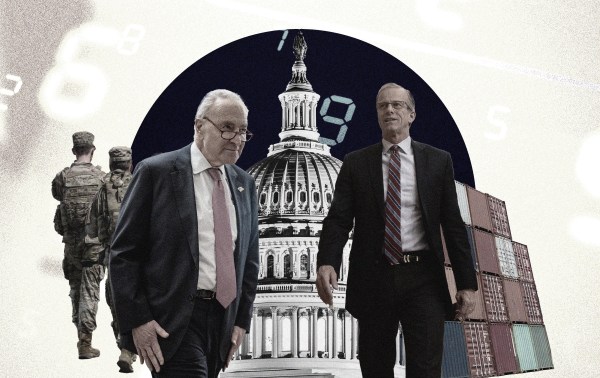Turn any article into a podcast. Upgrade now to start listening.
Premium Members can share articles with friends & family to bypass the paywall.
Wildlife enthusiasts were relieved in the fall of 2023 when Congress approved a stopgap spending bill to avert a government shutdown. Had the government run out of money on September 30 of that year, the National Park Service’s annual Fat Bear Week—the agency’s celebration of bears who put on weight to prepare for their winter hibernation—would have been postponed.
Luckily, this year’s 11th anniversary of the service’s heralding of ursine plumpness is safe since it wraps up on September 30, but that is once again the deadline for Congress to fund the government, with no resolution in sight. Myriad other agencies will have their operations—and the services they provide to taxpayers—put on hold if lawmakers fail to pass a spending bill by the end of the month.
During a government shutdown, agencies furlough nonessential employees, so while essential services such as Social Security payments and law enforcement continue, certain functions will pause. It will be up to the Trump administration to decide what is essential and not essential. Just what the executive branch chooses to cut is weighing heavily on the minds of Republicans and Democrats as the shutdown fight comes to a climax this week. Democrats are in an especially precarious position because, while there is a risk of backlash against closures in a shutdown hitting the White House, a shutdown’s mechanics would heavily benefit President Donald Trump.
Six months ago, Senate Minority Leader Chuck Schumer folded when Republicans jammed his Democratic conference with a partisan spending measure, largely because he reasoned that filibustering the stopgap funding bill and thus shutting the government down would allow Trump, Department of Government Efficiency (DOGE) leader Elon Musk, and Office of Management and Budget (OMB) Director Russell Vought to further remake the federal workforce as they saw fit. “The decision on what is essential would be solely left to the executive branch, with nobody left at agencies to check them,” Schumer said in a floor speech at the time. “In short, a shutdown would give Donald Trump, Elon Musk, and DOGE, and Russell Vought the keys to the city, state and country.”
With DOGE less active today, that concern is less pronounced, and Schumer is under pressure to give Republicans stiffer opposition, vowing not to surrender like last time. But the concern that a shutdown could give the White House a freer hand over government agencies is still valid.
“They could use the shutdown as an opportunity to fire people. Those firings, I think, would be permanent,” Tevi Troy, a presidential historian who served in the George W. Bush administration, told The Dispatch.
And in fact, that’s what the Trump administration is saying it will do. An OMB memo from last week instructed agencies to prepare for mass firings of employees from programs whose funding has lapsed and whose mission is inconsistent with Trump’s priorities. The president has not hesitated to exert control over departments he believes are not in line with his agenda, even ousting officials from executive branch positions despite legal challenges.
But actually implementing widespread firings could be difficult, according to Elaine Kamarck, a senior fellow at the Brookings Institution who managed President Bill Clinton’s effort to streamline the federal government. A shutdown could affect the agencies and personnel that would carry out the dismissals. “Even when you're letting go of people, you still need people to let go of them legally, et cetera,” she told The Dispatch. “And there won't be anybody there to do that. Usually the HR functions is one of the first that close down.”
Whether or not firings do take place, agencies usually furlough employees during a funding lapse and cut down to a skeletal staff. That could lead to more terminations once the government reopens.
“If I was a Cabinet secretary,” Kamarck said, “I'd look around, and I’d say, ‘Well, where was it that we were able to operate with a fraction of the people who we normally had?’ If we operated efficiently, without much problem, during a shutdown with fewer people, then that might be a place where, ‘Well, we had too many people.’”
There could also be further downstream effects of a shutdown that would help Trump politically. American Enterprise Institute senior fellow Philip Wallach noted that the administration has argued that it has a significant amount of discretion in terms of distributing the funds that Congress has appropriated.
“I definitely think that the shutdown would give them a huge rhetorical weapon to kind of take that position even farther, to say, ‘Democrats are just completely against us, and the only way that we're going to keep this government functioning is by ignoring them, going ahead and doing what we know is right for the American people,’” he told The Dispatch.
The White House can exercise that rhetorical weapon in deciding what programs to fund and not fund during a shutdown. “The Trump administration could say, ‘We're not going to fund USAID programs,’ or something that Democrats like but that Republicans don't, for the duration of the shutdown,” said Troy. Opponents would almost certainly sue, but Troy argued that government shutdowns are usually short enough that the courts would not be able to respond in time to make the administration comply if a lawsuit were successful.
Trump would need to restore funding after Congress passed a spending bill, but he could argue on a political level that whatever programs he cut were not essential if the shutdown continued long enough without any particularly damaging effects. At the same time, a funding lapse could come back to bite the administration, Kamarck argued. She noted that nongovernmental organizations that rely on federal grants to do charitable work may need to close their doors during a shutdown, so people might notice the absence of such institutions in their communities. “Given experience of past administrations during shutdowns, it’s more likely to boomerang on them,” Kamarck said.
There is one piece of a shutdown that seems to have little upside for Trump. For months, there has been a backlog of nominations that the Senate has struggled to confirm as quickly as Trump had hoped. That prompted Republicans to change the Senate rules so that they can approve civilian nominations to the executive branch (but not Cabinet officials or members of the judiciary) as a group; the Senate confirmed 48 nominees at once earlier this month. Thune has created a bloc of more than 100 nominees to ambassadorships, U.S. attorney posts, and more that he hopes to confirm all at once, but a confirmation vote is pending.
Even with the government shut down, the Senate could still vote to confirm the group, but onboarding the nominees would be difficult. “Particularly [with] an ambassador, there's a lot of training, protocol, all sorts of stuff that they need to learn and get familiar with before they get on a plane and go to whatever country they're going to be in to represent the United States,” Kamarck said. “So the people who do that, I would think a lot of them would be affected by the shutdown, so that would delay things.”
Now Senate Democrats must weigh whether to capitulate and support a continuing resolution to fund the government through November 21, a measure that has already passed the House, or allow the government to shut down over their demands for a repeal of changes to health care programs in Republicans’ One Big Beautiful Bill Act and a permanent extension of Affordable Care Act tax credits. One part of the political calculus they will have to consider is whether voters will blame them or their Republican opponents. On the one hand, Republicans have control of Congress, so voters could pin any impacts on them. But the GOP could also argue that Democrats—who are staking their opposition to the Republican stopgap measure chiefly on a health policy issue unrelated to appropriations—are holding things up as a minority. One thing is certain, however: Despite the risks, there are a lot of ways in which Trump benefits from a shutdown.
“The truth is, the executive branch has more cards to play in a shutdown,” said Troy. “They just do.”







Please note that we at The Dispatch hold ourselves, our work, and our commenters to a higher standard than other places on the internet. We welcome comments that foster genuine debate or discussion—including comments critical of us or our work—but responses that include ad hominem attacks on fellow Dispatch members or are intended to stoke fear and anger may be moderated.
With your membership, you only have the ability to comment on The Morning Dispatch articles. Consider upgrading to join the conversation everywhere.